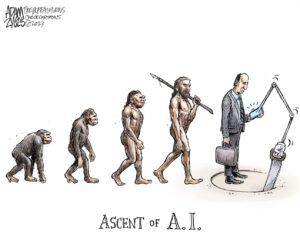A Cry for Gold in San Francisco
High rents, human displacement and the disappearance of do-it-yourself culture -- author and activist Rebecca Solnit artfully describes the social costs of the last decade of San Francisco's tech boom.
High rents, human displacement and the disappearance of do-it-yourself culture — author and activist Rebecca Solnit artfully describes the social costs of the last decade of San Francisco’s tech boom.
— Posted by Alexander Reed Kelly.
Your support matters…Rebecca Solnit at the London Review of Books:
Where orchards grew Apple stands. The work hours are still extreme but now the wages are colossal – you hear tech workers complaining about not having time to spend their money. They eat out often, though, because their work schedules don’t include a lot of time for shopping and cooking, and San Francisco’s restaurants are booming. Cafés, which proliferated in the 1980s as places to mingle and idle, are now workstations for freelancers, and many of the sleeker locales are routinely populated by silent ranks staring at their Apple-product screens, as though an office had suddenly been stripped of its cubicles. The more than 1700 tech firms in San Francisco officially employ 44,000 people, and a lot more are independent contractors doing piecework: not everyone rides the bus down south. Young people routinely make six-figure salaries, not necessarily beginning with a 1, and they have enormous clout in the housing market (the drivers of the Google Bus, on the other hand, make between $17 and $30 an hour).
… A Latino who has been an important cultural figure for forty years is being evicted while his wife undergoes chemotherapy. One of San Francisco’s most distinguished poets, a recent candidate for the city’s poet laureate, is being evicted after 35 years in his apartment and his whole adult life here: whether he will claw his way onto a much humbler perch or be exiled to another town remains to be seen, as does the fate of a city that poets can’t afford. His building, full of renters for most or all of the past century, including a notable documentary filmmaker, will be turned into flats for sale. A few miles away, friends of friends were evicted after twenty years in their home by two Google attorneys, a gay couple who moved into two separate units in order to maximise their owner-move-in rights. Rental prices rose between 10 and 135 per cent over the past year in San Francisco’s various neighbourhoods, though thanks to rent control a lot of San Franciscans were paying far below market rates even before the boom – which makes adjusting to the new market rate even harder. Two much-loved used bookstores are also being evicted by landlords looking for more money; 16 restaurants opened last year in their vicinity. On the waterfront, Larry Ellison, the owner of Oracle and the world’s sixth richest man, has been allowed to take control of three city piers for 75 years in return for fixing them up in time for the 2013 America’s Cup; he will evict dozens of small waterfront businesses as part of the deal.
All this is changing the character of what was once a great city of refuge for dissidents, queers, pacifists and experimentalists. Like so many cities that flourished in the post-industrial era, it has become increasingly unaffordable over the past quarter-century, but still has a host of writers, artists, activists, environmentalists, eccentrics and others who don’t work sixty-hour weeks for corporations– though we may be a relic population. Boomtowns also drive out people who perform essential services for relatively modest salaries, the teachers, firefighters, mechanics and carpenters, along with people who might have time for civic engagement. I look in wonder at the store clerks and dishwashers, wondering how they hang on or how long their commute is. Sometimes the tech workers on their buses seem like bees who belong to a great hive, but the hive isn’t civil society or a city; it’s a corporation.
Independent journalism is under threat and overshadowed by heavily funded mainstream media.
You can help level the playing field. Become a member.
Your tax-deductible contribution keeps us digging beneath the headlines to give you thought-provoking, investigative reporting and analysis that unearths what's really happening- without compromise.
Give today to support our courageous, independent journalists.






You need to be a supporter to comment.
There are currently no responses to this article.
Be the first to respond.